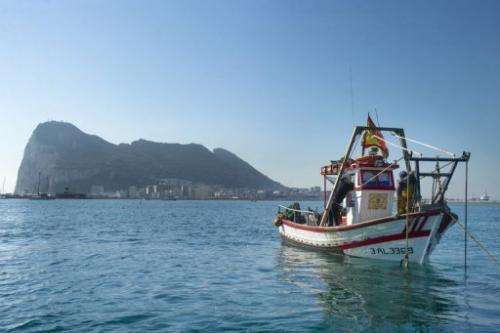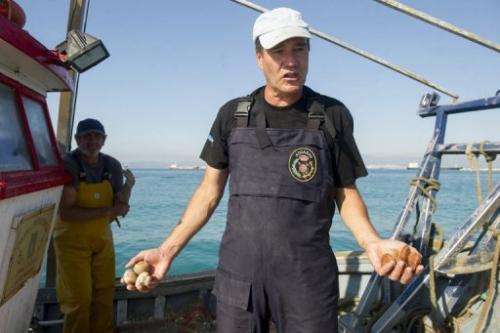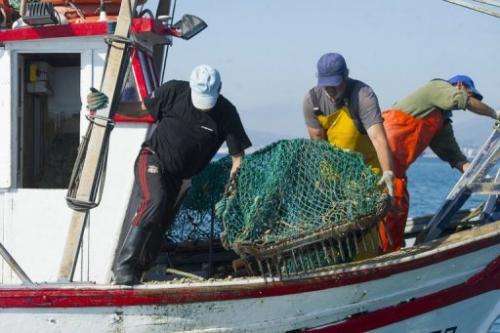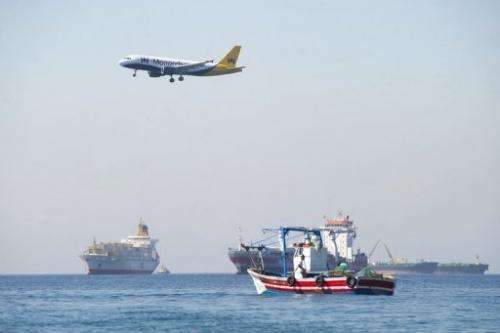Spanish fishermen say Gibraltar reef ruins catch

Spanish fishermen say their catch has been ruined by Gibraltar's decision to drop concrete blocks in waters surrounding the tiny British outpost.
The British-held territory's unilateral decision in July to set up an "artificial reef" to protect fishing grounds blocked Spanish fleets, infuriating Madrid.
Britain now accuses Spain of retaliating by imposing excessive customs checks at the border to Gibraltar, leading to daily, hours-long queues of cars.
For the Spanish fishing boats that work the Gibraltar Strait, it is not just a question of diplomacy.
As fisherman Francisco Gomez hauled in dredge nets that scoop up shellfish from the seabed, he lamented the quality of the clams in his catch.
"This is nothing like the shellfish you can catch over there," he said, pointing to the area that has been sealed off to Spanish boats for weeks by Gibraltar's artificial reef.
Captain of the "Divina Providencia" (Divine Providence), an old eight-metre (26-foot) fishing boat carrying a Spanish flag, 51-year-old Gomez has fished for years in the waters that lie at the heart of the most recent flare-up between Spain, Gibraltar and Britain.
It is the latest in a string of diplomatic rows over the self-governing British overseas territory, which measures just 6.8 square kilometres (2.6 square miles) and is home to about 30,000 people.
Spain ceded Gibraltar to Britain in perpetuity in 1713 but has long argued that it should be returned to Spanish sovereignty. London says it will not do so against the wishes of Gibraltarians, who are staunchly pro-British.
Gibraltar's government says the concrete reef will help rebuild fish stocks.

Fishermen from crisis-hit Spain's depressed southern region of Andalusia say the reef has removed one of their best fishing grounds.
"Over there you can catch 30 to 60 kilos (65 to 130 pounds) of clams a day, for which they pay us nine euros ($12) a kilo. But here you get thin shells that fetch two euros and moreover there are only a few of them," Gomez said.
"We have been here six hours now, since five in the morning, and we have got just 40 kilos," he said while emptying four trawler nets.
They sailed a short way, always staying close to shore, and threw the trawler nets back into the sea.
Pointing to the area 1.5 kilometres (one mile) away where Gibraltar dropped the concrete blocks, Gomez said: "If we did this over there, the dredges would get caught in the blocks and we would break the boat in half."

Gibraltar, which has no fishing fleet, says the intensive fishing by Spanish boats is unsustainable. Spain says the British-held territory is imposing its environmental rules in waters that Madrid claims as its own.
"I think we know more about the environment than the politicians," said Gomez.
The Spanish fisherman said he had been charged by the Gibraltar authorities in May for "entry into British waters, illegal fishing, reckless navigation and failure to respect the authorities."
"To respect the environment, they should start by removing the floating refuelling ships," he said, alluding to the offshore refuelling stations that are another irritant in ties between Gibraltar and Spain.
As he spoke, a dolphin-viewing tourist boat passed by three merchant ships that were anchored off Gibraltar and being refuelled by a tanker via long hoses carried to them by small supply ships.
"Gibraltar is bringing us to ruin with all this," said 74-year-old Juan Morente in the fishing port of La Linea de la Concepcion just across the border from Gibraltar.

Sitting on a small stool between fishing nets, Morente, who no longer goes out to sea and leaves the boat in his sons' hands, removed the heads of thousands of fish and threw them into the sea, watched keenly by seagulls.
His boat now fishes far from the disputed waters.
Fishing is one of the few ways to earn a living in La Linea, a poor town in Andalusia, a region with an unemployment rate of 35.8 percent.
So the fishermen are hard to budge from their fishing grounds.
Elias Marquez, 56, takes his boat close to the concrete blocks of the artificial reef.
"I have been fishing here for 43 years and I am not scared of the blocks, or the Gibraltar police," he said.
© 2013 AFP



















